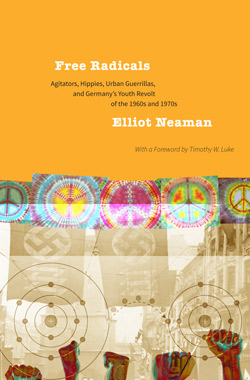Telos Press is delighted to announce that Elliot Neaman’s Free Radicals: Agitators, Hippies, Urban Guerrillas, and Germany’s Youth Revolt of the 1960s and 1970s has won first place in the History category at the London Book Festival. Congratulations!
|
Elliot Neaman’s Free Radicals: Agitators, Hippies, Urban Guerrillas and Germany’s Youth Revolt of the 1960s and 1970s is now available for purchase in our online store. Save 20% on the list price by using the coupon code BOOKS20 during the checkout process. Also available in ebook format at Amazon.com (Kindle) and Barnes & Noble (NOOK). Free Radicals
Elliot Neaman’s Free Radicals presents a comprehensive panorama of the West German youth revolt in the 1960s, as well as its subsequent fragmentation and descent into terrorism in the 1970s. Neaman argues that the activists of the 1960s fundamentally misconstrued the nature of the young German republic, conflating it with earlier problematic German polities, and offered hazy world-shattering utopias to replace it based on artificial historical comparisons. The student radicals at first were swept along by liberalizing forces, but then made a decisive turn against reform in favor of an aggressive rejection of the existing order. Coming on October 1st: Elliot Neaman’s Free Radicals: Agitators, Hippies, Urban Guerrillas and Germany’s Youth Revolt of the 1960s and 1970s. Pre-order your copy in our online store, and we will ship it once it is available. Save 20% on the list price by using the coupon code BOOKS20 during the checkout process. Free Radicals
Elliot Neaman’s Free Radicals presents a comprehensive panorama of the West German youth revolt in the 1960s, as well as its subsequent fragmentation and descent into terrorism in the 1970s. Neaman argues that the activists of the 1960s fundamentally misconstrued the nature of the young German republic, conflating it with earlier problematic German polities, and offered hazy world-shattering utopias to replace it based on artificial historical comparisons. The student radicals at first were swept along by liberalizing forces, but then made a decisive turn against reform in favor of an aggressive rejection of the existing order. The following paper was presented at the Seventh Annual Telos Conference, held on February 15–17, 2013, in New York City. |
||||
|
Telos Press Publishing · PO Box 811 · Candor, NY 13743 · Phone: 212-228-6479 Privacy Policy · Data Protection Copyright © 2025 Telos Press Publishing · All Rights Reserved |
||||

 In Faith of The Faithless: Experiments in Political Theology, Simon Critchley writes: “What is lacking is a theory and practice of the general will understood as the supreme fiction of final belief that would take place in the act by which a people becomes a people or by which a free association is formed” (92). Critchley’s work turns to poetics or “making” as a mode of engagement and resistance for dealing with democratic-liberal crises. I suggest that psychedelic aesthetics and religion can provide a discursive ground for Critchley’s “supreme fiction” in the United States, because the making of the sacrificial figure in the psychedelic experience presents itself as capable of more ethically aware citizenship. A brief historical look at religions founded in the 1960s gives insight into the instantiation of a certain citizenship.
In Faith of The Faithless: Experiments in Political Theology, Simon Critchley writes: “What is lacking is a theory and practice of the general will understood as the supreme fiction of final belief that would take place in the act by which a people becomes a people or by which a free association is formed” (92). Critchley’s work turns to poetics or “making” as a mode of engagement and resistance for dealing with democratic-liberal crises. I suggest that psychedelic aesthetics and religion can provide a discursive ground for Critchley’s “supreme fiction” in the United States, because the making of the sacrificial figure in the psychedelic experience presents itself as capable of more ethically aware citizenship. A brief historical look at religions founded in the 1960s gives insight into the instantiation of a certain citizenship. 

